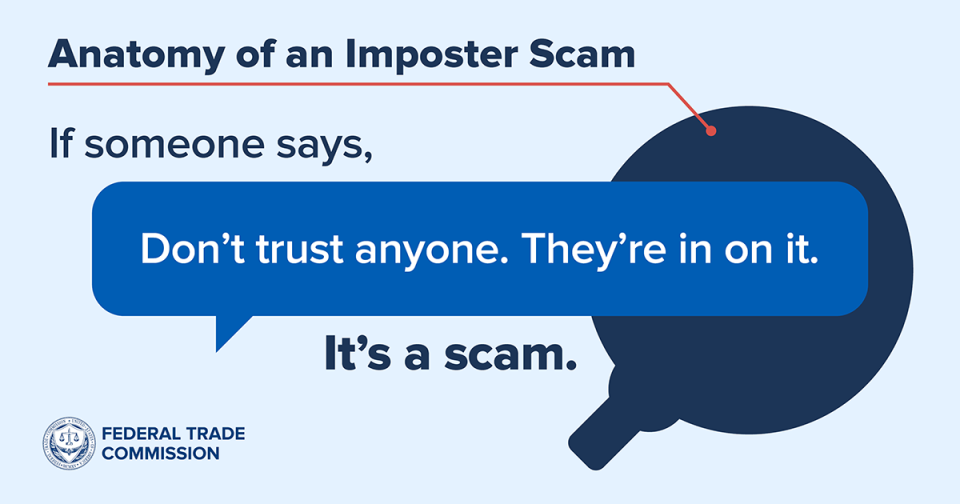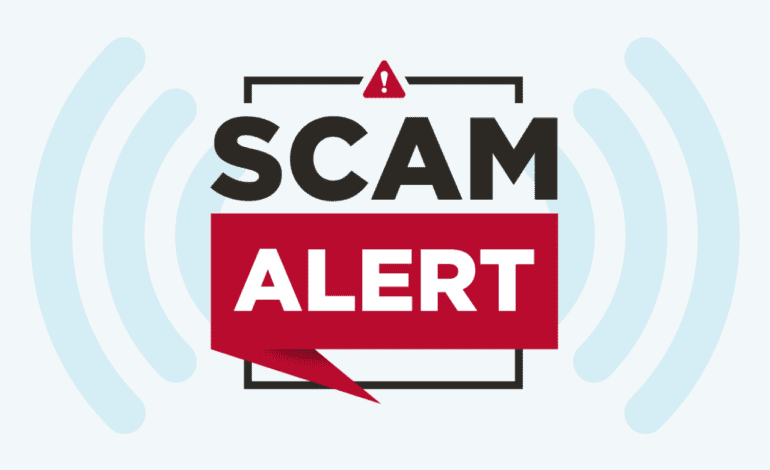
Scammers say and do things that can tell us they’re lying — and they’re not who they pretend to be. Of course, to hear or see those clues, we have to get past the panic scammers make us feel, thanks to the so-called emergencies they try to create. And since scammers are convincing, that can be hard to do. But recent scams are costing people their life savings, so here are some sure ways to spot the scammer.
Things only scammers will say:
- “Act now!” That’s a scam. Scammers use pressure, so you don’t have time to think. But pressuring you to act now is always a sign of a scam. It’s also a reason to stop.
- “Only say what I tell you to say.” That’s a scam. The minute someone tells you to lie to anyone — including bank tellers or investment brokers — stop. It’s a scam.
- “Don’t trust anyone. They’re in on it.” That’s a scam. Scammers want to cut you off from anyone who might slow you down.
- “Do [this] or you’ll be arrested.” That’s a scam. Any threat like this is a lie. Nobody needs money or information to keep you out of jail, keep you from being deported or avoid bigger fines. They’re all scams.
- “Don’t hang up.” That’s a scam. If someone wants to keep you on the phone while you go withdraw or transfer money, buy gift cards, or anything else they’re asking you to do: that’s a scammer. DO hang up.
And here’s a list of things that only scammers will tell you to do:
- “Move your money to protect it” is a scam. Nobody legit will tell you to transfer or withdraw money from your bank or investment accounts. But scammers will.
- “Withdraw money and buy gold bars” is a scam. Always. Every time.
- “Withdraw cash and give it to [anyone]” is a scam. Doesn’t matter who they say: It’s a scam. Don’t give it to a courier, don’t deliver it anywhere, don’t send it. It’s a scam.
- “Go to a Bitcoin ATM” is a scam. Nobody legit will ever insist you get cryptocurrency of any kind. And there’s no legit reason for someone to send you to a Bitcoin ATM. It’s a scam.
- “Buy gift cards” is a scam. There’s never a reason to pay for anything with a gift card. And once you share the PIN numbers on the back, your money’s as good as gone.
If you see or hear any version of any of these phrases, you’ve just spotted a scammer. Instead of doing what they say, stop. Hang up. Delete the email. Stop texting. Block their number — anything to get away from them. And then, tell someone you trust and report the scam to the FTC: ReportFraud.ftc.gov.

Our “Anatomy of an Imposter Scam” blog series breaks down how to recognize, avoid and report business and government imposter scams. Read more.
- Never move your money to “protect it.” That’s a scam
- What’s a verification code and why would someone ask me for it?
- Will your bank or investment fund stop a transfer to a scammer? Probably not
- Sure ways to spot a scammer
- Did you get a call or text about a suspicious purchase on Amazon? It’s a scam
- New tech support scammers want your life savings
- Did someone send you to a Bitcoin ATM? It’s a scam






Leave a Reply